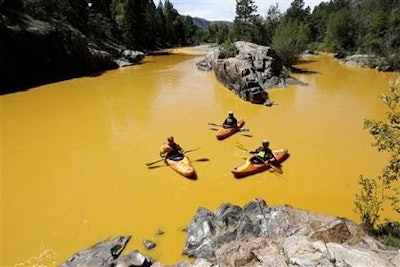
The Environmental Protection Agency says the mine waste spill into Colorado waters is much larger than originally estimated.
But an EPA official said Sunday that she doesn't believe wildlife will suffer significant health impacts from the wastewater from an abandoned mine in southwestern Colorado.
The agency said the amount of heavy-metal laced water that leaked from the Gold King Mine into the Animas River, turning the water a mucky orange and then yellow, is three times larger than its initial estimate.
The EPA now says 3 million gallons of wastewater spilled Wednesday and Thursday, instead of 1 million. The revision came after the EPA used a stream gauge from the U.S. Geological Survey.
The agency has so far been unable to determine whether humans or aquatic life face health risks. However, EPA toxicologist Deborah McKean said the sludge moved so quickly after the spill that it would not have "caused significant health effects" to animals that consumed the water.
The discolored water from the spill stretched more than 100 miles from where it originated near Colorado's historic mining town of Silverton into the New Mexico municipalities of Farmington, Aztec and Kirtland.
The leading edge of the plume was headed toward Utah and Montezuma Creek near the town of Bluff, a tourist destination. The town, which is populated by a few hundred people, is surrounded by scenic sandstone bluffs.
Local officials were preparing to shut down two wells that serve Montezuma Creek, said Rex Kontz, deputy general manager for the Navajo Tribal Utility Authority.
To keep water flowing to homes, the residential tank in Halchita has been filled with clean water hauled 40 miles from Arizona.
Back in Colorado where the spill started, the EPA planned to meet with residents of Durango, downstream from the mine. The EPA water tests near Durango are still being analyzed.
The EPA has not said how long cleanup efforts will take. An EPA-supervised crew trying to enter the mine to pump out and treat the water caused the spill.






















